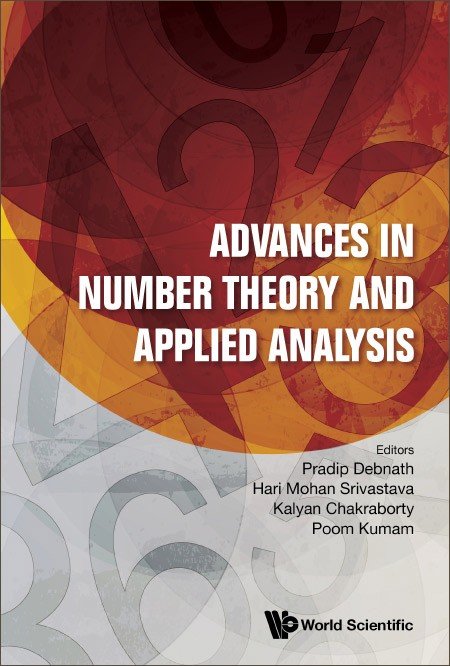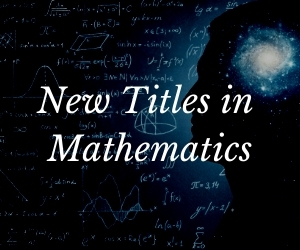Presently, the exploration of the applications of different techniques and tools of number theory and mathematical analysis are extensively prevalent in various areas of engineering, mathematical, physical, biological and statistical sciences. This book will present the most recent developments in these two fields through contributions from eminent scientists and mathematicians worldwide.
The book will present the current state of the art development in these two areas through original new contributions and surveys. As such, readers will find several useful tools and techniques to develop their skills and expertise in number theory and applied analysis. New research directions are also indicated in each of the chapters. This book is meant for graduate students, faculty and researchers willing to expand their knowledge in number theory and mathematical analysis. The readers of this book will require minimum prerequisites of analysis, topology, number theory and functional analysis.
Sample Chapter(s)
Preface
Chapter 1: Open Problems in Number Theory
Contents:
- Open Problems in Number Theory (Pradip Debnath)
- Arithmetic and Congruence Properties of Partition Function (Nabanita Konwar)
- Collatz Hypothesis and Kurepa's Conjecture (Nicola Fabiano, Nikola Mirkov, Zoran D Mitrović, and Stojan Radenović)
- On Zeta Functions and Allied Theta Functions (Hongyu Li, Takako Kuzumaki, and Shigeru Kanemitsu)
- Sylvester Sums on the Frobenius Set in Arithmetic Progression with Initial Gaps (Takao Komatsu)
- Arithmetic Properties of Minimal Excludants of Partitions of Integers (Nipen Saikia)
- On Certain ℓ-regular Partitions: A Brief Survey (Chiranjit Ray)
- Some Applications of an Algorithm in Number Theory (Nihal Özgür)
- The Components Exponential Function in Scator Hypercomplex Space: Planetary Elliptical Motion and Three-Body Choreographies (M Fernández-Guasti)
- Caristi-Type Nonunique Fixed-Point Results and Fixed-Circle Problem on bv(s)-Metric Spaces (Nihal Taş and Ozgur Ege)
- Extended Interpolative Hardy–Rogers–Geraghty–Wardowski Contractions and an Application (Samira Hadi Bonab, Vahid Parvaneh, Zohreh Bagheri, and Roghayeh Jalal Shahkoohi)
- (η,ψ)-Rational F-Contractions and Weak-Wardowski Contractions in a Triple-Controlled Modular Type Metric Space (Hemant Kumar Nashine, Samira Hadi Bonab, and Vahid Parvaneh)
- Sufficient Conditions for Mittag-Leffler Functions Associated with Conic Regions (Amit Soni and Deepak Bansal)
- Results on the Existence of Solutions for Some Controlled Optimization Problems (Savin Treanţă)
- The Theory of Nonabsolute Integrable Function Spaces over R∞ and Its Various Applications (Hemanta Kalita and Bipan Hazarika)
- Subclass of Analytic Functions Involving Mittag-Leffler Type Borel Distribution Series (P Thirupathi Reddy and B Venkateswarlu)
- Hybrid Accelerated Conjugate Gradient Method for Solving Nonlinear System of Equations (Abubakar Sani Halilu, Arunava Majumder, Mohammed Yusuf Waziri, and Idris Ahmed)
- A Closed Form of Integral Transforms in Terms of Lauricella Function FA(n) and Their Numerical Simulations (Abdelmajid Belafhal, Halima Benzehoua, and Talha Usman)
Readership: Graduate students and researchers in Number Theory and Applied Analysis.
Pradip Debnath is an Assistant Professor (in Mathematics) at the Department of Applied Science and Humanities, Assam University, Silchar (a central university). He received his PhD in Mathematics from the National Institute of Technology Silchar, India. His research interests include fixed point theory, nonlinear functional analysis, soft computing and mathematical statistics. He has published more than 60 papers in various journals of international repute and is an active reviewer for more than 40 international journals. He is also a reviewer for Mathematical Reviews published by the American Mathematical Society. He is the Lead Editor of the books Metric Fixed Point Theory — Applications in Science, Engineering and Behavioural Sciences (2021, Springer Nature), Soft Computing Techniques in Engineering, Health, Mathematical and Social Sciences (2021, CRC Press), Fixed Point Theory and Fractional Calculus: Recent Advances and Applications (2022, Springer Nature) and Soft Computing: Recent Advances and Applications in Engineering and Mathematical Sciences (2023, CRC Press). He is a topical advisory panel member of the journal Axioms and a guest editor of the special issue entitled Nonlinear Functional Analysis in Natural Sciences in the same journal. He has successfully guided PhD students in the areas of nonlinear analysis, soft computing and fixed point theory. He has recently completed a major Basic Science Research Project in fixed point theory funded by the UGC, the Government of India. Having been an academic gold medalist during his post-graduation studies from Assam University, Silchar, Dr Debnath has qualified several national-level examinations in mathematics in India.
Hari M Srivastava is Professor Emeritus at the Department of Mathematics and Statistics, University of Victoria, Canada. He has been Clarivate Analytics (Thomson-Reuters) Highly Cited Researcher for the years 2015, 2017, 2018 and 2020. He has also been listed and ranked in the Sixth Place in General Mathematics among the Top 2% Scientists in the World 2021 (Published by Stanford University in USA). In fact, it is not quite possible to list out his tremendous academic achievements in a few sentences. The details of the same may be found in his regularly updated website www.math.uvic.ca/~harimsri/.
Kalyan Chakraborty is at present the Director of the Kerala School of Mathematics, India. Previously he was working as a Professor at Harish-Chandra Research Institute (HRI), Allahabad, India, where he also obtained his PhD in Mathematics. Professor Chakraborty was a postdoctoral fellow at IMSc, Chennai, and at Queen's University, Canada, and a visiting scholar at the University of Paris VI, VII, France; Tokyo Metropolitan University, Japan; Universitá Roma Tre, Italy; The University of Hong Kong, Hong Kong; Northwest University and Shandong University, China; Mahidol University, Thailand; Mandalay University, Myanmar; and many more. His broad area of research is number theory, particularly class groups, Diophantine equations, automorphic forms, arithmetic functions, elliptic curves, and special functions. He has published more than 60 research articles in respected journals and two books on number theory, and has been on the editorial boards of various leading journals. Professor Chakraborty is Vice-President of the Society for Special Functions and their Applications.
Poom Kumam received the BS, MSc, and PhD degrees in mathematics from Burapha University (BUU), Chiang Mai University (CMU), and Naresuan University (NU), respectively. In 2008, he received a grant from Franco-Thai Cooperation for short-term visited at the Laboratoire de Mathematiques, Universite de Bretagne Occidentale, France. He was also a Visiting Professor for a short-term research with Professor Anthony To-Ming Lau at the University of Alberta, AB, Canada. He is currently a Full Professor with the Department of Mathematics, King Mongkut's University of Technology Thonburi (KMUTT), where he is also the Head of the KMUTT Fixed Point Theory and Applications Research Group since 2007 and also leading of the Theoretical and Computational Science Center (TaCS-Center) in 2014 (now, became to TaCS-Center of Excellence in 2021). He has successfully advised 5 master's, and 44 PhD graduates.
He had won of the most important awards for mathematicians. The first one is the TRF-CHE-Scopus Young Researcher Award in 2010 that is the award given by the corporation from three organizations: Thailand Research Fund (TRF), the Commission of Higher Education (CHE), and Elsevier Publisher (Scopus). The second award was in 2012 when he received the TWAS Prize for Young Scientist in Thailand, which is given by the Academy of Sciences for the Developing World TWAS (UNESCO) together with the National Research Council of Thailand. In 2014, the third award is the Fellowship Award for Outstanding Contribution to Mathematics from International Academy of Physical Science, Allahabad, India. In 2015 Dr Poom Kumam has been awarded Thailand Frontier Author Award 2015, Award for outstanding researcher who has published works and has often been used as a reference or evaluation criteria of the database Web of Science. Moreover, In 2016 Dr Poom Kumam has been awarded 2016 Thailand Frontier Researcher Awards on Innovation Forum: Discovery, Protection, Commercialization By Intellectual Property & Science, and Thomson Reuters. Dr Poom Kumam has been Highly Cited Researcher (HCR 2015, 2016, 2017). Moreover, he has been received KMUTT-HALL OF FAME 2017, In Honour of the Recipients of Academic Awards, KMUTT Young Researcher Awards, Excellence in Teaching Awards for 2016. In 2019 he received 2019 CMMSE Prize Winner: The CMMSE prize is given to computational researchers for important contributions in the developments of Numerical Methods for Physics, Chemistry, Engineering and Economics. from CMMSE Conference June 30-July 6, 2019, Rota, Cadiz - Spain. He has also been listed and ranked in the 197th Place in General Mathematics among the Top 2\% Scientists in the World 2021 (Published by Stanford University in USA).



